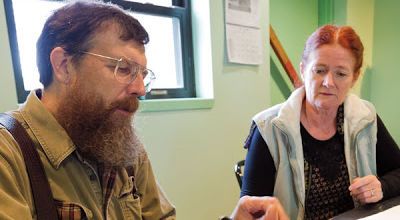Long before European explorers and traders began arriving in northern Quebec and Labrador, the Naskapi people followed their main food source, the caribou, across the barren tundra from Hudson Bay in the west, to Labrador’s east coast. Then in 1831, the Naskapis pitched their tents near the Hudson’s Bay Company (HBC) trading post at Fort Chimo—beginning a long trading relationship with the storied British company. But over time, the Naskapis grew increasingly dependent on the HBC for food and supplies.
Ironically, the HBC’s role in providing physical food for the hardy northern band led to the Naskapis’ first taste of “milk” from God’s Word. Anglican clergy attached to the HBC posts introduced the Naskapis to the gospel, teaching some of them to read and write from a Cree translation of the New Testament. Eventually, the band embraced Anglican forms of worship, using Cree Scriptures, prayer books and hymns. For more than 100 years, the Naskapis relied on literate elders to read aloud from the Cree texts and interpret “on the fly” whenever they gathered to worship.
Then in the late 1960s, a Wycliffe-initiated language survey of northern Quebec identified the need for a Naskapi translation of the Bible. The survey opened the door for a long-term language project that resulted in the publication of the Naskapi New Testament in 2007 (see Word Alive, Spring 2008). Furthermore, the project has helped spark renewed interest among the Naskapis in their own history and culture, as well as mother-tongue literacy.
Turbulent History
Today, more than 1,100 Naskapis live in the community of Kawawachikamach [KA-wa-wa-CHIK-ah-match], a 15-kilometer drive northeast of Schefferville, Que. A mining town built in the mid-1950s by the Iron Ore Company of Canada (IOC), Schefferville is accessible only by air or a 550–kilometer train ride from Sept-Iles.
Kawawa’s name means “by a winding lake”, but the picturesque community, surrounded by verdant forests and endless muskeg, has only been the Naskapis’ home for the past 30 years.
After Fort Chimo closed in 1842, the Naskapis trekked southward to be near another HBC trading post, Fort Nascopie. Thus began a long and turbulent history that included three more major upheavals, until 23 families left Fort Chimo by canoe in the summer of 1956 and headed for Schefferville.
While details are disputed, it was reported that officials in Schefferville had no idea the Naskapis were coming and had to scramble to find a suitable place for them to settle. In any case, for the first time in their history, the Naskapis began living in houses, at nearby John Lake.
They endured one more forced relocation until finally, after negotiating agreements in the 1970s with both the federal and provincial governments, they moved for the last time in 1983 to their own community of Kawawa.
Called by God
In 1987, God was preparing a young couple from Connecticut, Bill and Norma Jean Jancewicz, to work among the Naskapis. Bill had just completed a linguistics course taught by SIL, a major Wycliffe partner organization, but expected that he’d be serving in a support role like graphic design or running a print shop.
“We had been praying, ‘Lord, what do you want us to do?” Bill says. “We had thought about serving in Canada or Alaska, so we were kind of leaning that way.”
Bill visited Kawawa that year with Wycliffe’s Don Hekman, who had done a language survey in the area. They met with members of the band council, who invited Bill to return with his family and live in the community of 300-plus.
Sensing that God was calling them to help translate Scripture into Naskapi, Bill and Norma Jean moved with their two young children to Kawawa in 1988. The family’s transition into community life was aided by the use of English as the second language in Kawawa and also in nearby Schefferville (along with French). As Norma Jean cared for their children and got to know their neighbours, Bill concentrated on learning the Naskapi language. Fortunately for him, Wycliffe’s Lana Martens and Carol Chase had done some foundational language analysis during the ’70s and linguists affiliated with Memorial University of Newfoundland were working on a Naskapi dictionary.
In the early ’90s, the Naskapi Development Corporation (NDC) invited Bill to help edit, check and transcribe words for the dictionary. A typographic font he designed to format and print Naskapi syllabic characters using computers, called “BJCree” was used for the three-volume lexicon, published in 1994, and for subsequent publications—including the New Testament.
Nourished by the Word
Many Naskapis contributed to the translation of the Naskapi New Testament, which was published and dedicated in 2007. While Bill facilitated the project, several Naskapis served as mother-tongue translators while various Naskapi elders checked their translations for accuracy, clarity and naturalness.
During church services, Naskapi Scripture is read aloud from a Naskapi-English lectionary, which contains systematic Scripture readings used widely by the Anglican Church. Available in book form since 2011, the lectionary provides a three-year pattern for Sunday readings—including significant Old Testament passages. The congregation also uses a Naskapi prayer book and sings from a book of hymns in their language.
Other Scripture publications include “Walking with Jesus,” an illustrated series on the life of Christ adapted by permission from the Canadian Bible Society, and the book of Genesis, which has been checked by readers in the community and was published earlier this year.
Like other First Nations in Canada, the Naskapis are fighting to preserve their mother tongue. Many Naskapi people never learned to read their language, because it was not taught systematically until after the language project was underway in the ’90s. And while the local school began teaching Naskapi children to read and write their language about a dozen years ago, the Naskapi spoken by the young generation is being shaped by modern culture and other factors.
“When I came here, I noticed that most of the kids are speaking Naskapi,” says Kawawa school principal, Curtis Tootoosis, a Cree man originally from Saskatchewan. “But when I spoke to [some of the adults] about it, they said they’re not speaking pure Naskapi. They said it’s kind of a ‘watered down’ version.
“Satellite TV and the Internet influences their vocabulary,” he adds. “And [it’s often diluted with] a mix of English, French and Innu (formerly known as Montagnais, spoken by another First Nation in the area).
For those reasons and others, it’s clear to see that the availability of vernacular Scripture is making a difference for people in their homes and in church. But Ruby Sandy Robinson, an NDC administrator and grandmother who is just beginning to read her own language, says having the New Testament in Naskapi is a blessing.
“It’s very important to me, and I think to my nation, my community, that there’s finally a book—God’s Word—in our everyday language.”
See an error in this article?
To contact us or to submit an article




















